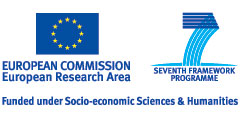Eunamus Newsletter+
December 2010
Call for papers
Eunamus co-organises the session Current trends and issues in European museum research in Norrköping Sweden 15-17 June, 2011.
This twin session is a collaborative effort of ongoing research projects at Linköping University, Stockholm University, the Nordiska Museet and the National Historical Museum. It invites researchers doing innovative research exploring the role of museums in the wider culture to share their approaches and results contributing to comparative reflections on the role of museums and their collections. Topics could relate to identity politics; the sociomaterial dynamics of museum collections; institutional histories; museums, education and reform; post-colonialism; nationalisms; repatriation; and relations between research and policy development.
Peter Aronsson Lotten Gustafsson-Reinius
Eva Silvén Fredrik Svanberg
More information on the conference here
New edited collections on museums, national history and participatory media
The ways that nations are imagined and anchored in objects in museums is one of many story lines in National Museums. New Studies from around the World. This collection, put together by leading researchers in Eunamus, explores national museums in a range of contrasting contexts from Europe to China and Korea. It includes introductions and reflections as well as the three thematic sections: Origins and ideologies, Museology and participation; Ourselves and others. The book is the first of many to come from Eunamus and one of its editors is Routledge's author of the month, Dec 2010.
Not only museums, but also national histories, are at the heart of the research pursued within Eunamus. Therefore we are very happy to note that two new edited collections on this subject have been recently published. Both are the outcomes of NHIST, a major international project on the history of historiography in Europe led by Professor Stefan Berger.
Nationalizing the Past. Historians as Nation Builders in Modern Europe engages in a “comparative and transnational analysis of how some of the most important national historians in Europe have handled the opposing pulls of fact and fiction and which narrative strategies have contributed to the success of national histories”. Moreover, this "volume also shows how Twentieth century dictatorships have influenced the ways in which the past has been 'nationalized' by historians and asks whether national history as a genre still has a future in the Twenty-first century".
Disputed Territories and Shared Pasts.Overlapping National Histories in Modern Europe deals instead with how different nations, from their respective perspectives, have written comparable histories of their shared pasts in contested territories. It is about narratives on aggression, hostile neighbours and international conflicts across borders.
The ways museums handle present problematic issues such as racial and political violence, climate change, sexual politics and more, both within and across current nations, is the subject of Hot Topics, Public Culture, Museums. One of the questions highlighted by one of the collection’s editors, Fiona Cameron, is: “how can museums effectively engage contentious topics in new ways considering that in a contemporary complex society, pluralism and discursive conflict is an emergent contemporary condition?” Moreover, “hot topics” are here theorised in connection with the spread of digital technology and social media.
Web 2.0, interactive installations and so forth have entered the spaces of museums as means to connect to networks beyond the institutions and to bridge gaps between citizens and museum professionals. History of Participatory Media. Politics and Publics, 1750-2000 provide historically grounded critical perspectives on the perceived newness of today’s participatory media. The collection includes chapters on exhibitions as participatory media as well as a chapter on the intertwining of social aspects and digital technology in a Swedish national museum. The latter chapter is also an example of how quickly the use of social media changes. After the chapter was written several of the museum's researchers have started blogs on highly topical issues.
Bodil Axelsson
Norrköping December 8, 2010


